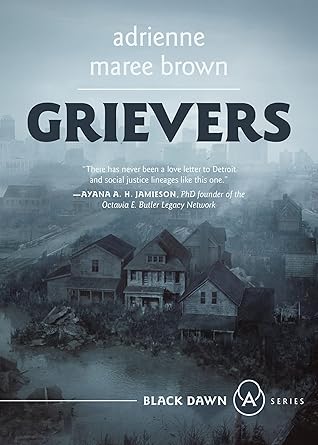More on this book
Community
Kindle Notes & Highlights
Neighbors would huddle on nearby porches, theorizing with Kama on arson and what the city would do with the plot of land, hoping it wouldn’t be another skeleton of char or some flavorless condo; unclear what they hoped it would be.
Kama was a full-figured blue-black woman. She had been wronged early and often in life. She grabbed everything by the collar and pulled it in too close—love, babies, joy, pain, disaster. Her anger was as contagious as her laughter. Now her quiet was terrible and grand, filling up the small space behind the curtain and then the room she was moved into.
Vivian first came to Detroit in the 60s to support the work of the Black power movement, leaving her professor husband, Roger, at their small flat in San Francisco. Their marriage was a meeting of minds, it didn’t matter so much where their bodies happened to be.
“Abundance comes through meaningful work, the opportunity to be somebody who means something to other somebodies.”2
By then, Wes was a handsome, divorced curmudgeon. He proposed to Vivian in his matter-of-fact way the first time they had dinner after she got to town, after insulting her musical taste, in the middle of a conversation about challenging the mayor.
For thirty years Wes and Vivian had organized and thought and shaped the city, side by side. While he lived, she often looked to him for leadership, or thought of her work as supporting his. When he died after a short battle with cancer, she decided to continue moving his ideas for the rest of her life, humility keeping her from understanding that the ideas had been collaborative since he’d met her.
A tidal wave of questions poured out, flooding the kitchen, too loud. No one knew how to be tender anymore, it was all interrogation.
While Bab carried her inquisitive sorrow up the stairs to visit the elder, Dune escaped to the backyard. The dog was there again, as if he had been waiting for her. He sat close enough to be a comfort and she decided, officially, to call him Dog.
Anchors spoke of the syndrome in the careless, drastic manner of the twenty-four-hour news cycle. In absence of facts, they offered fearful possibilities, theories, tweets from local politicians and performative condolences.
His weathered, brown skin was covered in blue tattoos from another life, and his afrobeard reached down, gray and black in twisted tendrils that made him look as if he was eating an octopus.
Dune had never been oriented towards sacred things. She had the gift of a magical mother and had coasted on that, indulging secular interests, taking risks of spirit, knowing she was prayed over.
Dune loved their love story—Kama had fallen in love with Brendon the first time she saw him ask a question in a meeting.
This house was the place Kama had trusted to hold her child.
Kama had been generous here. In this house she had known abundance. Here, she had gathered all that she had in this disappointing world.
She closed her eyes, willed a calming breath. Tears gathered at the precipice between her internal and external worlds.


